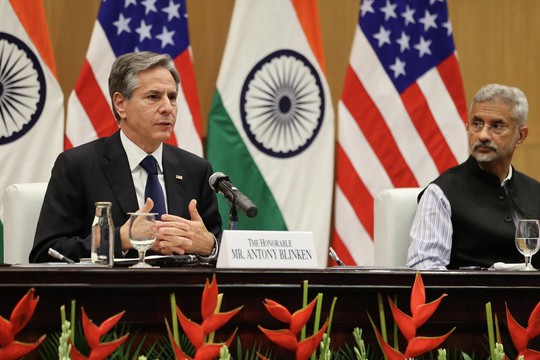U.S. Secretary of State Antony Blinken, left, and India's Minister of External Affairs Subrahmanyam Jaishankar hold a joint news conference in New Delhi.
Photo: Reuters
An undercurrent of America's diplomatic high-handedness with India causes misgivings and affects trust-building, writes Kanwal Sibal, ex-Foreign Secretary of India, Ambassador to Turkey, Egypt, France and Russia, and Deputy Chief Of Mission in Washington.
In releasing the State Department's 2023 International Religious Freedom report recently, US Secretary of State Antony Blinken referred to India by name for violating religious freedom. The report covers 190 countries. In his short introductory remarks, Blinken had to decide which countries he should mention by name, as he could cite only a few that are of most concern" to the US.
Blinken obviously made the assessment that India was one of the countries he needed to draw specific attention to. He had also to weigh the diplomatic consequences of naming and shaming any country at his level, and evidently thought that he did not need to be too concerned about India's reaction.
Such kind of reports issued annually are one of the many ways through which the US seeks to exercise its political hegemony and assume moral superiority at the global level. The US has huge problems of its own on all the issues it seeks to name and shame others on. Its record on the genocide of the indigenous population of America and slavery and racial discrimination against Blacks is a dark blot on its history. The violence endemic in American society is compounded by its gun laws. The scale of random attacks on streets, schools, concerts, malls, etc., is unequalled in the Western world. Democracy itself in the US is under great stress given the rampant political polarisation, politicisation of justice, the influence of lobbies in the political process, contested elections, and so on.
Externally, the US has sought to impose its values" on other countries through interference in their internal affairs, regime change policies, and military interventions that are inevitably accompanied by human losses and destruction of property and infrastructure. Ironically, for geopolitical gains, the US has in some geographies promoted the very ideologies that it also seeks to combat.
All this does not deter the US from publishing annual reports on international religious freedom, terrorism, human rights, etc. These reports are part of an eco-system of American or West-sponsored human rights and democracy promotion organisations, which include a large number of groups that work on ranking countries in areas such as press freedom, freedoms in general, corruption, etc. They serve as tools to exert political pressure on countries.
As regards hate speech, the US needs to look inwards at the level of political hate between Republicans and Democrats as well as against immigrants, besides the intolerance that 'woke-ism' represents.
The MEA spokesperson has responded adequately to this accusation. For a country that has sown mayhem in the Islamic world and is itself under attack for the position it is taking on Gaza, some reticence while pointing a finger at India would have been advisable. This uncalled interference in India's affairs should have been avoided. This is not a lever that the US should want to use to pressure the Indian government.
However, this undercurrent of America's diplomatic high-handedness with India causes misgivings and affects trust-building. On the one hand, India is lauded as the world's biggest democracy and much is made of the values that the two countries share. On the other hand, Blinken has chosen to chide India shortly after it concluded the biggest democratic exercise in human history. This shows a lack of refinement in US diplomacy.
read more in our Telegram-channel https://t.me/The_International_Affairs

 9:40 04.07.2024 •
9:40 04.07.2024 •























